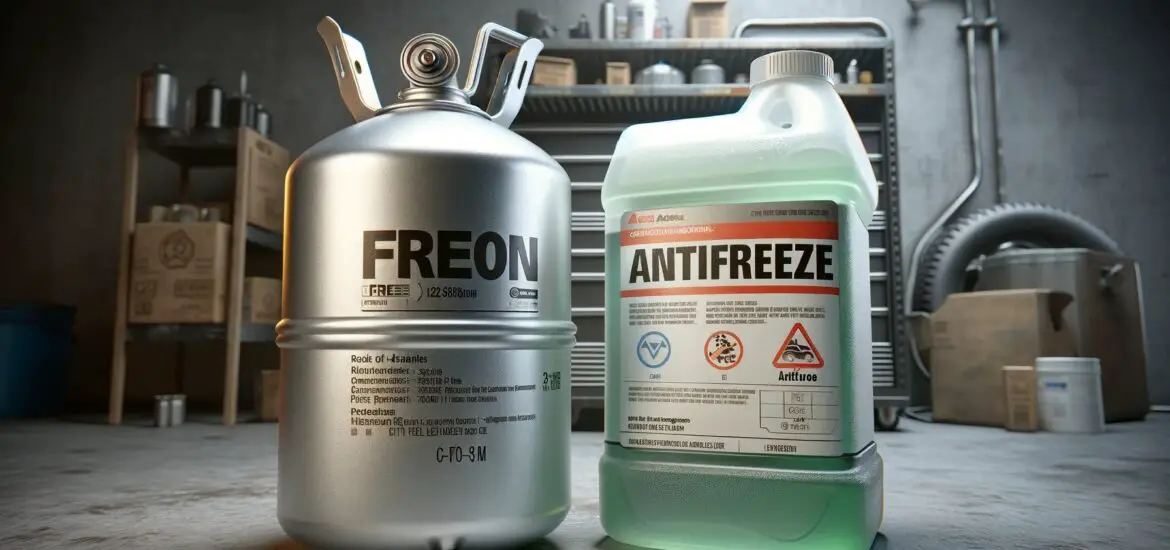This article will reveal the difference between freon vs antifreeze, thereby providing you with all the information you need to know.

Table of Contents
Understanding Freon
Freon, a term often used to refer to refrigerants, is a key component in the air conditioning systems of most vehicles. It operates in a closed-loop system, changing from a gas to a liquid and back.
This allows it to absorb heat from the vehicle’s interior and expel it outside. The efficiency of freon can degrade over time, which may require a recharge of the system.
Different types of freon have been used historically, with R-12 being common in older vehicles and R-134a used in more modern cars. The type of freon used is crucial as it must be compatible with the vehicle’s AC system.
It’s also important from an environmental perspective. Incorrect or outdated types of freon can damage the air conditioning system and have adverse environmental impacts.
Role of Antifreeze
Antifreeze is a critical fluid in the cooling system of a vehicle’s engine. It is typically a mixture of water and glycol (ethylene or propylene).
It functions by circulating through the engine to absorb heat and dissipate it via the radiator. This process keeps the engine from overheating and, in colder climates, prevents the water in the cooling system from freezing.
Antifreeze also contains additives that prevent corrosion in the cooling system, thereby extending the life of the engine and its components. The proper concentration of antifreeze to water is vital for optimal performance. Too much water can lead to freezing, while too much antifreeze can reduce its heat-absorbing capabilities.
Freon vs Antifreeze: Key Differences
The primary difference between freon and antifreeze lies in their function and application within a vehicle.
Freon is exclusively used in air conditioning systems to regulate the temperature inside the vehicle. It does this by absorbing heat from the cabin air and expelling it outside.
Antifreeze, in contrast, is used in the engine’s cooling system. It maintains the engine temperature, ensuring it doesn’t overheat when operating under high temperatures and doesn’t freeze in cold conditions.
This distinction is vital because using the wrong fluid in either system can cause severe damage to the vehicle, leading to costly repairs.
Safety and Environmental Concerns
Handling both freon and antifreeze requires awareness of their safety and environmental implications. Freon, especially older types like R-12, can be harmful to the ozone layer and contribute to global warming. Newer types, such as R-134a, are less harmful but still require proper handling.
Antifreeze, being a chemical mixture, is toxic and poses a risk of poisoning if ingested by humans or animals. It’s also a pollutant to the environment if not disposed of properly.
It’s crucial to handle these substances with care, following all safety guidelines. You also need to dispose of them according to local environmental regulations to minimize their impact on the environment and public health.
Maintenance and Replacement
Regular maintenance of both freon and antifreeze is essential for the smooth operation of a vehicle. The air conditioning system should be checked periodically for the correct level of freon, and for any signs of leaks or damage. If the AC system is not cooling effectively, it may require a recharge of freon.
As for antifreeze, its level and condition should be checked regularly, especially before winter and summer. Antifreeze should be replaced according to the manufacturer’s guidelines, typically every 30,000 to 50,000 miles.
Regular checks for leaks in the cooling system are also vital. Consulting a professional mechanic for the maintenance and replacement of these fluids is recommended to ensure correct handling and avoid potential damage to the vehicle.